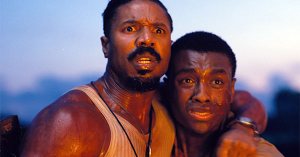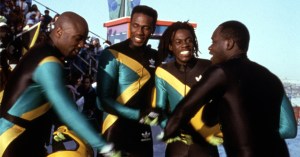CANNES: "Fast Food Nation" Cast And Writers Offer Food For Thought
"Fast Food Nation" is a film about the fast food industry, but the points it makes are not limited to burger chains, writer Eric Schlosser said. "I think you could have looked at a number of other industries in the same period of time and written a similar sort of book," he said. "The reason this book was effective in some ways is that it took [a look at] an industry that everyone has a connection to."
"Fast Food Nation," which screened in competition at Cannes and opens in the U.S. this fall, comes at the burger industry from a variety of angles. The film, directed by Richard Linklater, follows immigrant workers who take dangerous jobs in a meatpacking plant, a marketing executive who is stunned to learn of the plant�s conditions, and a high school girl who becomes disillusioned with her job at the local burger franchise. Linklater, Schlosser, and cast members Ethan Hawke and Catalina Sandino Moreno discussed the film in roundtable interviews at Cannes.

Greg Kinnear with "Fast Food Nation" director Richard Linklater
The film is based upon Schlosser’s nonfiction book of the same name. When Schlosser first contacted Linklater about making the book into a film, Linklater said he didn’t feel he was up to the task.
"I said, ‘you should get a documentary guy because I don’t really do documentaries,’" he said. "I love the book, but I don’t really know how to do documentaries. Eric had the idea to make it a look at the people behind the book, the people depicted in the book. A character piece."
Making a narrative fiction film would be a better way to keep the book’s edge, Schlosser said.
"I had met with different documentary filmmakers but none of the options seemed very good," Schlosser said. "I was very worried about the book being toned down, because one of the television networks would be putting up the money for the documentary and I didn’t really trust in the political climate that there wouldn’t be pressure to soften it. I started thinking about it as a feature."
When Moreno read the script that Linklater and Schlosser had penned, she was excited, because she felt it captured the essence of the immigrant workers who are an essential, but overlooked, part of the fast food industry.
"I couldn’t stop reading it," she said. "I felt it’s important, like in ‘Maria [Full of Grace],’ to put a face and flesh and a voice to people you just don’t think about."
That’s part of the appeal of working with Linklater, said Ethan Hawke, who has appeared in six of the director’s films. Hawke has a small role in the film as the uncle of a teenager who works at a chain restaurant.
"I believe in him so much," Hawke said. "There’s very few filmmakers like him. I like his sensibility. It’s fun to work with someone who’s so different than all the other directors. He’s not interested in glamorizing anything or making life more beautiful.
"We’re kind of, like, in a band together," he continued. "I play steel guitar, or something. When he needs that in his movie, that’s when he hires me."
As the times have become more turbulent, Hawke said he’s glad to see Linklater make films with a more overtly political bent.
"He’s always had a very deep and keen political mind," he said. "With ‘A Scanner Darkly’ and ‘Fast Food Nation,’ he’s bent his mind in that direction."
For Linklater, it took a little while to come to the issues that he addresses in the film. He said he was once told by a health teacher in junior high that a burger, fries, and a shake was a well balanced meal because it contained all the food groups.
"I was this kid who grew up in East Texas, I grew up eating fast food," he said. "I grew up not thinking much about health."
Later, though, Linklater said he became more concerned about the health effects, the treatment of animals, and environmental impact of the fast food industry.
"[In] my adult life, I had feelings about these industries and my own relation to it, and Eric’s book confirmed what I thought, but took it to a whole new comprehensive level and deepend those thoughts," he said. "The opportunity to do a movie took me farther into it."

Ethan Hawke and Patricia Arquette
Hawke said he has had conflicting feelings on fast food throughout his life.
"I grew up on fast food," he said. "I worked at Burger King when I was in high school. It was terrible. I hated it.
"I ate it all the time when I was first on my own," he continued. "It’s cheap and convenient and I loved it. [But] I feel a sense of shame if I take my kids there, so I don’t."
Still, Hawke still eats fast food from time to time, he said.
"It’s kind of like saying you’re not going to smoke anymore, and then two months go by and you’re doing it again," he said.
The meatpacking industry became a lightning rod for controversy 100 years ago with Upton Sinclair’s "The Jungle," a muckraking book that took the industry to task for the poor conditions within meatpacking facilities. While things have improved in many ways, Schlosser said, there are still many problems, including poor treatment of animals, pollution from animal waste, food poisoning from substandard meat, and lower pay for workers.
"Things are better now than they were when Upton Sinclair wrote ‘The Jungle,’" he said. "What’s sad is that you can read this book and how similar things are in some ways. Things got much better, especially for meatpacking workers in the 1930s, 1940s and 1950s. Meatpacking used to be one of the best paid industrial jobs in the United states as recently as 1980 it was like being an auto worker. But it’s only in the last 20 years that things have gotten much worse."
One of the reasons is that the meatpacking industry has utilized illegal immigrant labor, and slashed pay rates substantially, Schlosser said.
"The big meatpacking companies brought in the illegal immigrants and recent immigrants and cut wages by 50, 60 percent," he said. "These workers are completely disposable. It’s very significant that on May 1, when there were all these immigrant protests in the United States, the big slaughterhouses shut down because there was nobody to process the meat."
While conditions and pay may not be optimal, many immigrant workers see meatpacking jobs as a chance for opportunities that don’t exist where they come from, Moreno said.
"Everybody goes to America to search for the American dream, to find a better life and to find money to send their families," she said. "I think they have to do that. In their countries, they don’t have the money or the means to take care of the people that they love."
And telling the stories of these workers is one of the most important things for Linklater.
"I think I’m most proud that the movie makes you care about some people that you’re not supposed to care about or even think about," he said.
The fast food industry could still make money and make a better product, but it would require an overhaul in the way the industry currently operates, Schlosser said.
"There could be ways to make food that’s fast, and that’s convenient, and that tastes good, but you’d have to let go of some of the notions of control and cutting costs," he said. "One of the reasons this fast food is so bad is that they don’t want to pay any worker to have to cook anything, because if you have a trained cook you have to pay a good wage."
There are steps that citizens can take to ensure that their health comes first, Linklater said.
"It’s a good time to eat a little healthier," he said. "People could shift their priorities more toward health, not only for themselves and their loved ones, but for the planet, for the animals.
"People are kinda questioning this uber-industrialization of the food supply," he continued. "I’d be really happy if people saw it and could look at some of the costs behind this food, and maybe think to just be a little healthier."








